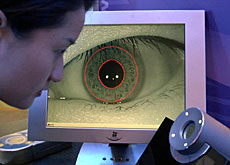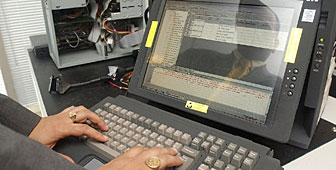Privacy – a thing of the past?

Privacy may soon be a forgotten concept, if the gloomiest predictions of technology experts are to be believed.
And, according to speakers at a specialist forum in Zurich, legal safeguards could soon lag far behind technological capabilities.
“Computers are becoming so small and cheap that they can already be embedded in all sorts of objects,” Professor Friedemann Mattern of Zurich’s Federal Insitute of Technology told swissinfo at a Symposium on Privacy and Security.
“That will certainly have consequences on privacy, and a major problem is that it usually takes quite some time for society to understand what’s going on and what has become technologically possible.”
The use of surveillance cameras in the fight against street crime is a commonplace example of people accepting restrictions on privacy in the interest of “a greater good”.
Less conspicuous
But in his speech to the symposium, Mattern warned that future surveillance technology was likely to be considerably less conspicuous.
Tolerating street cameras is one thing. But do we want to live in a world where our luggage stores information on where we have been, our fridges monitor our calorie intake and our cars record information on our driving skills for instant analysis by insurance firms?
“In such a bizarre world, we would be faced not so much with a Big Brother as with a vast number of Small Siblings,” Mattern reckons. “It’s already been predicted that by 2010 privacy will become a meaningless concept in western societies.
“I don’t agree with that personally because I think people will continue to want privacy. But we have to be aware now and act rather quickly to understand what is technically possible and how we should react to it.”
Safeguard
Speakers at the symposium were also keen to stress that technology can play a part in helping to safeguard privacy. Microsoft security expert Jason Garms assured the delegates that the American software giant was firmly focussed on “trustworthy computing” following criticisms of lax practices in the past.
“We can’t just plead with people to start trusting us,” Garms told swissinfo afterwards. “Trust is something you earn over time. But we can lay out a road map of what we have done already and where we are going, and give our customers the ability to measure our progress.”
Between the present preoccupations of Microsoft and the distant possibilities of intelligent fridges there are concerns over the security of next generation mobile technology.
Mobility
Dr Wolfgang Seiler, chief technology officer at Allianz Suisse, reminded the IT specialists that greater mobility often comes at a cost to security with most pocket computers, phones and palmtops not sophisticated enough to handle decent encryption programmes.
Seiler also warned the symposium that serious questions still had to be answered about the security of the wireless hot-spots currently being installed in airports, coffee houses, businesses and homes.
While the ability to use one’s laptop without cables or fixed phone lines is clearly attractive to a lot of people, Seiler told delegates that the phone conversations and data transfers transmitted via radio waves could easily be intercepted by anyone with a basic antenna.
Of course many of the security warnings issued at the symposium were being preached to the converted and the real work will continue once the delegates return to their non-IT colleagues.
Seiler closed his speech with the findings of a recent survey in which 46 per cent of the people telephoned were happy to divulge their work passwords. Privacy may be an increasingly precious commodity, but it seems few are yet prepared to fight for it.
swissinfo, Mark Ledsom in Zurich
The meeting heard that personal privacy is at risk of being undermined by technology.
Wireless technology already means that phone conversations and data transfers transmitted via radio waves can easily be intercepted.
Once computers are installed in household objects, they will be able to provide detailed information about us. For instance, luggage will record where we travel and fridges will be able to monitor our calorie intake.
Experts warn that society needs to understand what is technically possible and how we should react to it.
The symposium is organised by the Foundation for Privacy and Information Security and funded primarily through sponsorship.
The first symposium was held in 1993.
More than 500 delegates took part in this year’s event.

In compliance with the JTI standards
More: SWI swissinfo.ch certified by the Journalism Trust Initiative

You can find an overview of ongoing debates with our journalists here . Please join us!
If you want to start a conversation about a topic raised in this article or want to report factual errors, email us at english@swissinfo.ch.